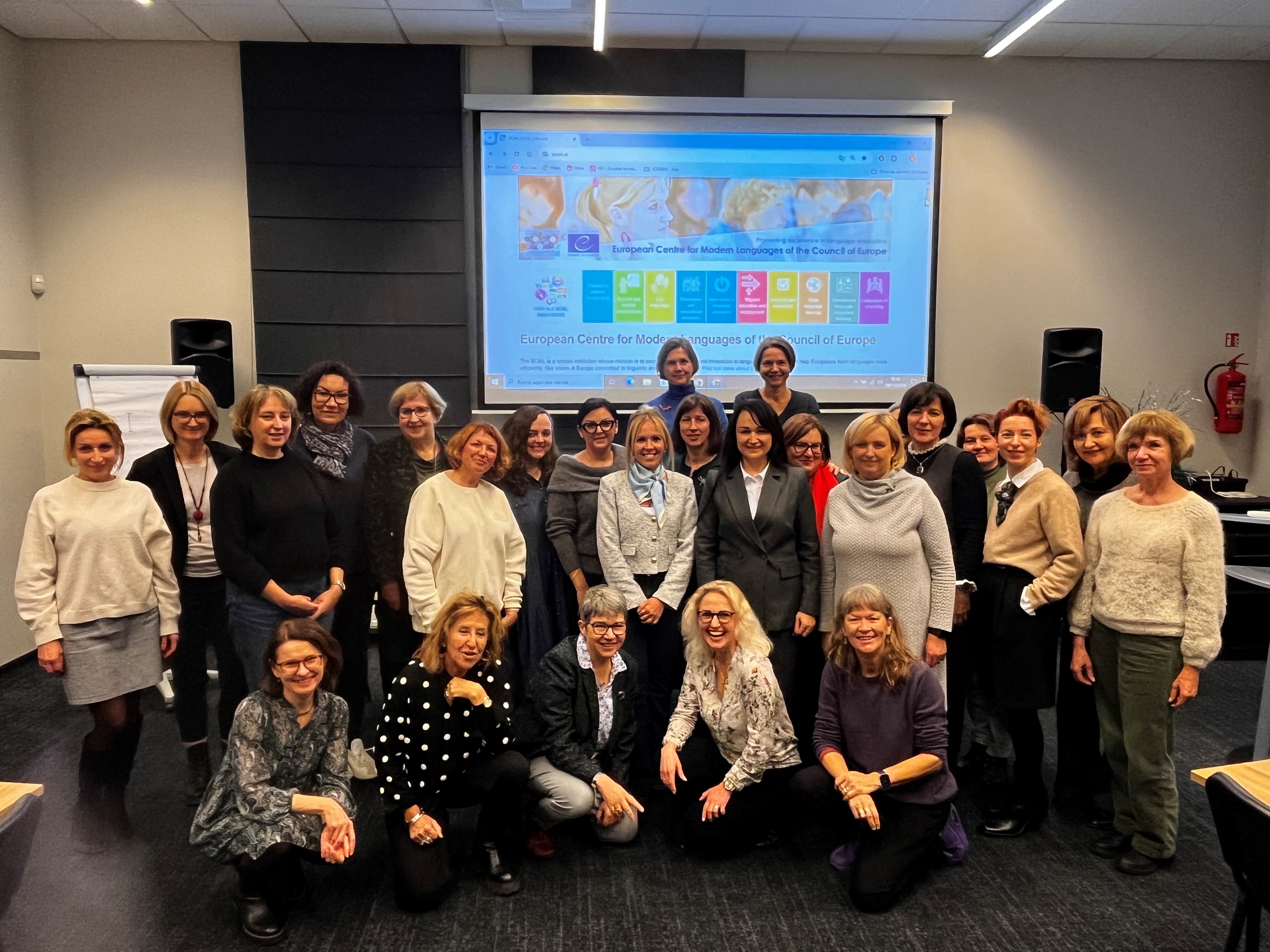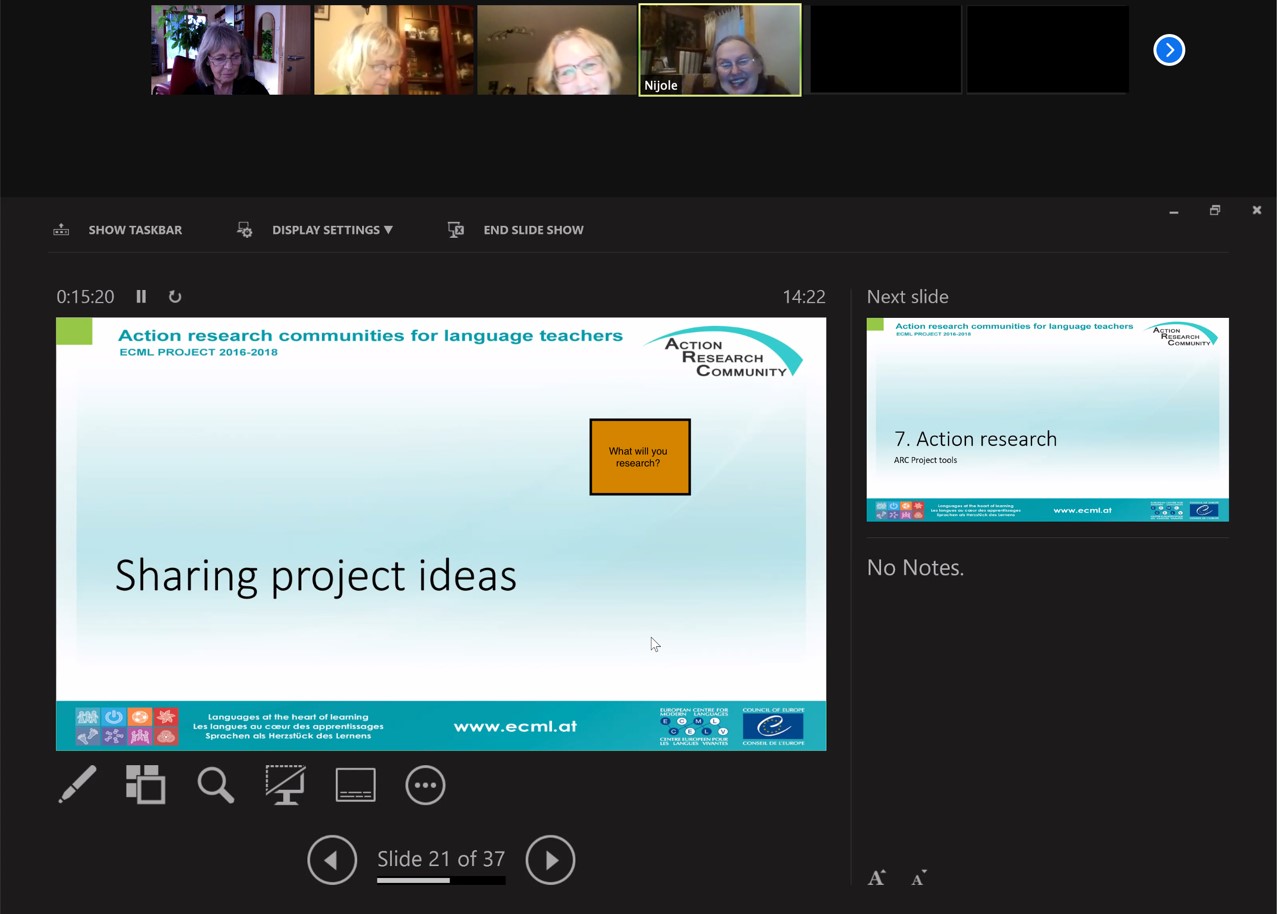News
18.12.2024
National Training Workshop “Using ICT in support of language teaching and learning (ICT-REV)” (29-30 November 2024, Vilnius, Lithuania)
Empowering Language Teachers Through ICT-REV Training
The ICT-REV workshop “Use of ICT in support of language teaching and learning” has proven to be a valuable experience for foreign language educators (teachers of English, German and French) providing practical tools and strategies to enhance teaching in the digital age. Organized by the European Centre for Modern Languages together with the Lithuanian Association of Teachers of English (LAKMA) and with the support of the Ministry of Education, Science and Sport of the Republic of Lithuania, this training offered educators ideas for integrating innovative ICT solutions into their classrooms as Lithuanian schools implement the updated, competence-oriented National Curriculum.
The workshop focused on helping teachers address key updates in the foreign language curriculum, such as developing mediation skills, supporting plurilingualism, and fostering global cultural awareness. Participants explored practical ways of using digital tools for activities like audiovisual text production, online interaction, and cross-curricular integration.
The workshop benefited foreign language teachers in several ways. The participants expanded their knowledge of ICT tools and resources, including the ECML’s Inventory of ICT Tools, and understanding how these tools align with modern pedagogical approaches. With support and collaboration, teachers became more confident and motivated to use ICT tools in their teaching. Foreign language teachers strengthened their professional competences, which are essential for increasing students’ motivation to learn foreign languages in a meaningful and effective way.
After the workshop, teachers are better prepared to meet curriculum demands and foster students’ communication and digital competences, ensuring they are ready for a globalized world.
Lithuanian version:
ICT-REV seminaras – vertinga patirtis užsienio kalbų mokytojams
Seminaras „Internetinių tecnhologijų taikymas kalbų mokyme ir mokymesi” tapo vertinga patirtimi užsienio kalbų (anglų, vokiečių ir prancūzų) pedagogams, suteikdamas praktinių įrankių ir strategijų, kaip efektyvinti mokymą skaitmeniniame amžiuje. Šiuos mokymus organizavo Europos šiuolaikinių kalbų centras kartu su Lietuvos anglų kalbos mokytojų asociacija (LAKMA), palaikant Lietuvos Respublikos švietimo, mokslo ir sporto ministerijai. Mokymų metu pedagogams buvo pristatytos idėjos, kaip integruoti inovatyvius IKT sprendimus į pamokas, įgyvendinant atnaujintą, kompetencijomis grįstą Bendrojo ugdymo programą.
Seminaro tikslas buvo padėti mokytojams įgyvendinti pagrindinius užsienio kalbų ugdymo programos atnaujinimus: ugdyti mediacijos gebėjimus, skatinti daugiakalbystę ir stiprinti globalų kultūrinį suvokimą. Dalyviai gilinosi į praktinius skaitmeninių įrankių taikymo metodus, tokius kaip audiovizualinių tekstų kūrimas, internetinė sąveika ir tarpdalykinė integracija.
Seminaras užsienio kalbų mokytojams buvo naudingas keliais aspektais. Dalyviai praplėtė žinias apie IKT įrankius ir išteklius, ir suprato, kaip šie įrankiai dera su šiuolaikiniais pedagogikos metodais. Bendradarbiavimas ir palaikymas mokymų metu padėjo mokytojams jaustis labiau pasitikinčiais savimi ir motyvuotais taikyti IKT savo pamokose. Be to, mokytojai stiprino profesines kompetencijas, kurios itin svarbios siekiant padidinti mokinių motyvaciją prasmingai ir efektyviai mokantis užsienio kalbų.
Dalyvavę mokymuose kalbų pedagogai yra geriau pasirengę įgyvendinti ugdymo programos reikalavimus bei lavinti mokinių komunikacinius ir skaitmeninius gebėjimus, suteikdami jiems galimybę sėkmingai veikti globaliame pasaulyje.
Kristina Urboniene, local coordinator

28.03.2023
National training workshop "Relating language curricula, tests and examinations to the Common European Framework of Reference (RELANG)", (7 – 9 March 2023, Vilnius, Lithuania)
Local organiser: Ingrida Strazdaitė, Lithuanian National Agency for Education
ECML experts: Karine Dekeukelaere, Belgium; Gábor Szabó, Hungary;
Participants: 27 (item writers, curriculum developers, language testers and examiners, policy-makers and teachers)
“In March 2023, a RELANG workshop was organised at the National Agency for Education in Vilnius for item writers, curriculum developers, exam raters, policymakers, and teachers with a view to discussing principles of valid and reliable language testing based on the CEFR and its Companion Volume. Module 5 was selected in relation to the updated curriculum of foreign languages in Lithuania, which involves both a new language proficiency level (B2+) and new test items in the school-leaving exam, namely, audio-visual comprehension, mediation, and a few new written production items. Thus it is important to ensure that future tests are in line with the CEFR.
During the three-day workshop, 27 participants received in-depth training in the CEFR level descriptors, they were introduced to a number of issues to be addressed in order to ensure valid and reliable item development and accurate assessment, discussed the importance of designing and use of reliable assessment criteria, and had an opportunity to develop specific exam items based on the principles learned. The workshop was also an excellent opportunity to exchange professional knowledge and practices in the field of language teaching and testing among the colleagues as well as to receive expertise and valuable guidance from the ECML experts. Despite the sometimes heated discussion, which was always moderated by the experts in a most constructive and sensible manner, all participants had one common goal – to gain a thorough and uniform understanding of the underlying requirements for each test item in line with the CEFR and the Companion Volume as a must for quality assurance in the assessment of school-leavers under the updated curriculum.
All RELANG workshops in Lithuania - and we had quite a few of them so far - were very successful and have always had a very positive impact on the Lithuanian school-leaving exam system. The workshop in March 2023 was no exception. We are very grateful for the ECML experts’ insights, practical tips, competent advice, efficiency and patience.”
Ingrida Strazdaitė, local organiser, 21 March 2023
ECML project website: RELANG – EU-ECML cooperation agreement 2023 "Innovative methodologies and assessment in language learning"

15.03.2021
“Action research for language teachers” in Lithuania: a powerful tool for learners, teachers and school development
ECML Training and Consultancy “Action Research for Language Teachers”
Organisation: Vytautas Magnus University, Education Academy, Institute of Teacher Professional Development, Lithuania
Training period: 28 September 2020 - 12 December 2020
Participants: 21 gymnasium language teachers, university researchers
Research on the improvement of pedagogical activities, by its nature and methodological features, encourages teachers to look for new forms and methods of teaching. Its essence is collaborative learning, which allows participants to systematically take action to solve specific teaching / learning problems that arise in the educational process. It is a team work that emancipates the communication between teachers and students, frees them from certain stereotypical relationships. because not only the teacher but also the student has to identify a problematic area of learning and choose a reasoned solution. The pedagogical improvement research activities and the results encourage teachers and students to reflect on their experiences with other colleagues, a wider circle of specialists. In this way, this research becomes useful not only for the personal development of the teacher and her/ his students, but also for the whole school community, including parents. The research data obtained can also be useful in developing new educational strategies, principles of educational policy.
The moderators of the seminar focused on developing the competence of language teachers. However, all the above-mentioned aspects of pedagogical improvement research were addressed. Taking into account the pandemic situation, the moderators, proposed new IT solutions, providing consultations, discussions and reflections on theoretical material, and involving project presentations from the participants. An excellent rapport was established between the teachers and participants of the workshop, and the teachers received answers to their questions. It proved a truly theoretically, technologically and practically relevant educational event that meets the needs of the educational community.
Contact: Nijolė Čiučiulkienė, Vice-Head of the Institute of Teacher Professional Development, Education Academy, Vytautas Magnus University, e-mail: [email protected]

Lithuanian version
Pedagoginės veiklos tobulinimo tyrimas kalbų mokytojams: seminarai ir konsultacijos
Pedagoginės veiklos tobulinimo tyrimas savo prigimtimi ir metodologinėmis savybėmis skatina mokytojus ieškoti naujų mokymo(si) formų ir metodų. Jo esmė - bendradarbiavimu grįstas mokyma(sis), leidžiantis proceso dalyviams sistemingai imtis veiksmų sprendžiant ugdymo procese kylančias specifines mokymo (si) problemas. Tai - komandinis darbas, kuris emancipuoja mokytojų ir studentų bendravimą, išlaisvina iš tam tikrų stereotipinių mokytojo "visažinio" ir mokio "tuščio stiklainio" santykių, nes ne tik mokytojas, bet ir pats mokinys turi nustatyti probleminę mokymosi sritį ir pasirinkti argumentuotą jos sprendimą. Pedagoginės veiklos tobulinimo tyrimo veikla ir gauti rezultatai skatina mokytojus ir jame dalyvavusius mokinius reflektyviai pasidalinti savo patirtimi su kitais kolegomis, platesniu specialistų ratu. Tokiu būdu šis tyrimas tampa naudingas ne tik mokytojo ir jo mokinių asmeniniam tobulėjimui, bet ir visai mokyklos bendruomenei, įskaitant tėvus. Gauti tyrimo duomenys taip pat gali būti naudingi, kuriant naujas švietimo strategijas, švietimo politikos principus.
Seminaro rengėjai daugiausia dėmesio skyrė kalbos mokytojų kompetencijos ugdymui. Vis dėlto, buvo paliesti visi, aukščiau minėti pedagoginės veiklos tobulinimo tyrimo aspektai. Seminaro organizatoriai, atsižvelgdami į pandemijos situaciją, pasiūlė naujus IT sprendimus, teikiant konsultacijas, diskusijas ir teorinės medžiagos apmąstymus, dalyvių projekto pristatymus. Taigi, seminaro dėstytojų ir dalyvių santykiai buvo glaudūs, ir mokytojai gavo atsakymus į jiems rūpimus klausimus. Tai tikrai teoriškai, technologiškai ir praktiškai aktualus, švietimo bendruomenės poreikius atliepiantis edukacinis renginys.
Doc. dr. Nijolė Čiučiulkienė
VDU Švietimo Akademijos,
Profesinio tobulėjimo Instituto vadovės pavaduotoja
[email protected]
05.05.2017
Recently published: European Language Gazette no. 36 (January-April 2017)
The European Language Gazette, the ECML's e-newsletter, provides up-to-date news about the ECML (events, projects, resources), the Language Policy Unit and other relevant sectors of the Council of Europe, as well as our partners. It focuses on national developments in the field of language education in the member states and beyond.
Read the latest issue: English - French
*****
Issue no. 36 – Contents
Focus on ECML programme developments – "Languages at the heart of learning" (2016-2019)
Latest project developments
"Language awareness in subject classes": participate in an online survey
"Towards a Common European Framework for Language Teachers": latest news
e-lang project in 2016: laying the foundations for a digital literacy in the language teaching and learning context
"Promoting excellence in sign language instruction (PRO-Sign2)": ECML workshop (Graz, Austria, 1-2 March 2017) – cooperation partnership with Moscow State Linguistic University
"A quality matrix for CEFR use": ECML workshop (Graz, Austria, 15-16 November 2016) – Interview with Denis Vigneron, French participant
ECML training and consultancy for member states
Network meeting of local organisers and ECML consultants (Graz, Austria, 7-8 March 2017) and upcoming national training workshops
National training workshop "Supporting multilingual classes" in Slovenia (Koper, 2-3 March 2017)
National workshops "A pluriliteracies approach to teaching for learning" in Malta (Floriana, 2-3 March 2017) and Latvia (Riga, 6-7 March 2017)
Forthcoming events
Recent ECML publication: Language skills for successful subject learning – CEFR linked descriptors for mathematics and history/civics
European Day of Languages
National developments in Armenia, Austria, Canada, France, Germany, Luxembourg, Malta, Poland, Slovenia, Switzerland
Professional Network Forum of the ECML: upcoming events
Council of Europe developments
The linguistic integration of adult migrants: some lessons from research
Council of Europe Ad hoc Committee of Experts on Roma and Traveller Issues (CAHROM) (ECML, Graz, Austria, 29-31 March 2017)
International Roma Day – 8 April
Pestalozzi programme: creating an online community of action researchers – summer school 2017
Framework Convention for the Protection of National Minorities: developments in Albania, Armenia, Azerbaijan, Bosnia and Herzegovina, Finland, Kosovo*, Lithuania, Moldova, Montenegro, Norway, Romania, Russian Federation, Slovenia, Sweden, Switzerland, Ukraine, United Kingdom, "The former Yugoslav Republic of Macedonia"
Urban policies for inclusive integration and diversity advantage: join the Intercultural Cities 2017 Milestone Event (Lisbon, Portugal, 28-29 November 2017)
Cyprus Chairmanship Conference in Nicosia: "Securing Democracy through Education"
Recent publication
Editorial news from other organisations: Eurostat, Eurydice, OECD, Unesco, Mercator European Research Centre on Multilingualism and Language Learning, Babylonia
Quick links
03.11.2016
European Language Gazette : enjoy the latest issue!
The European Language Gazette, the ECML's e-newsletter, provides up-to-date news about the ECML (events, projects, resources), the Language Policy Unit and other relevant sectors of the Council of Europe, as well as our partners. It focuses on national developments in the field of language education in the member states and beyond.
Issue no. 33 (September - October 2016): available in English and in French.